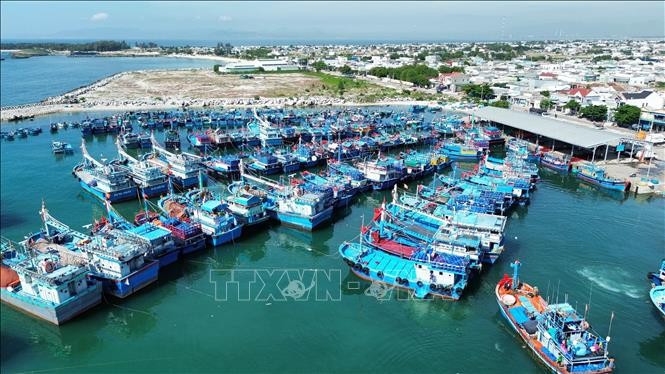According to Le Tran Nguyen Hung, Deputy Director of the ministry’s Department of Fisheries and Fishery Surveillance, amid risks of overfishing, environmental pollution, and resource depletion, the work has become a key priority, providing the scientific basis for sustainable management, conservation, and exploitation.
    |
 |
|
Offshore fishing fleet docks at My Tan fishing port in Thanh Hai commune, Ninh Thuan province. |
The survey of aquatic product resources enable the State and enterprises to demonstrate that Vietnam’s seafood is harvested within allowable limits, with clear traceability, and in full compliance with international standards on conservation and sustainable development.
In addition, the survey results support marine spatial planning by identifying conservation zones, fishing areas, and temporary no-catch zones during spawning seasons, thereby helping to build a comprehensive overview of Vietnam’s aquatic product resources, he said.
Hung noted that under Decision No.523/QD-TTg approving a program on overall survey and assessment of aquatic product resources and habitats of aquatic species nationwide through 2030, the next survey cycle will begin in 2026.
This is a key task to realize the Strategy for Sustainable Development of Marine Economy to 2030, with a vision to 2045, and the Vietnam Fisheries Development Strategy to 2030, with a vision to 2045, he said, noting that the program will be implemented nationwide in a coordinated, inter-regional, and integrated manner, building on and aligning with existing programs and projects to ensure effectiveness.
The survey will focus on establishing the scientific basis for aquatic product resources, fishing activities, and habitats; assessing resource fluctuations in marine and inland waters; and providing data to support planning, conservation, exploitation, and sustainable development of the fisheries sector, Hung added.
According to the official, the Ministry of Agriculture and Environment is upgrading the national database on aquatic product resources and exploitation, moving toward full digitalization of management, licensing, and quota allocation. The national survey data will focus on offshore areas, which are directly managed and quota-controlled by the ministry, while coastal and inland waters will be surveyed, assessed, and allocated quotas by local authorities within their delegated powers.
Hung said all of these data will be integrated into a central database, ensuring consistency in terms of methodology, standards, and management tools. Once completed, authorities will be able to easily monitor stock levels, fishing intensity, and transparent quota allocation.
Digital data will also help Vietnam demonstrate sustainable fisheries management and enhance the international reputation of its seafood, he added.
Source: VNA